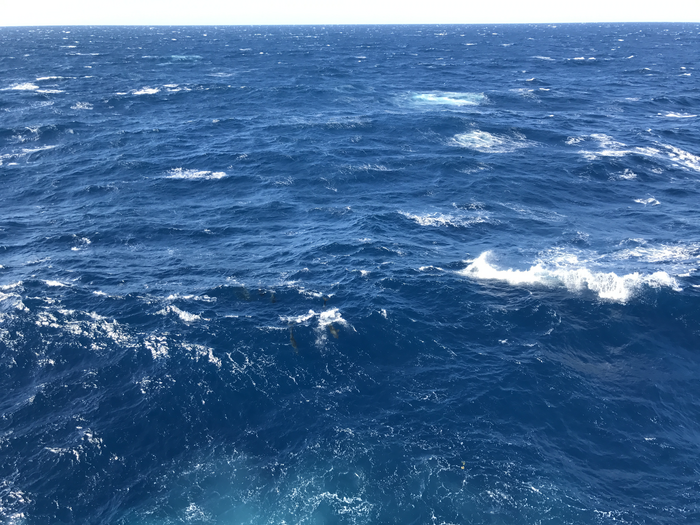The oceans help to limit global warming by soaking up carbon dioxide emissions. But scientists have discovered that intense warming in the future could lessen that ability, leading to even more severe warming.

Credit: Jackson School of Geosciences/Tiannong “Skyler” Dong
The oceans help to limit global warming by soaking up carbon dioxide emissions. But scientists have discovered that intense warming in the future could lessen that ability, leading to even more severe warming.
The discovery comes from a study led by The University of Texas at Austin in which researchers analyzed a climate simulation configured to a worst-case emissions scenario and found that the oceans’ ability to soak up carbon dioxide (CO2) would peak by 2100, becoming only half as efficient at absorbing the greenhouse gas by 2300.
The decline happens because of the emergence of a surface layer of low-alkalinity water that hinders the ability of the oceans to absorb CO2. Alkalinity is a chemical property that affects how much CO2 can dissolve in seawater.
Although the emissions scenario used in the study is unlikely because of global efforts to limit greenhouse gas emissions, the findings reveal a previously unknown tipping point that if activated would release an important brake on global warming, the authors said.
“We need to think about these worst-case scenarios to understand how our CO2 emissions might affect the oceans not just this century, but next century and the following century,” said Megumi Chikamoto, who led the research as a research fellow at the University of Texas Institute for Geophysics.
The study was published in the journal Geophysical Research Letters.
Today, the oceans soak up about a third of the CO2 emissions generated by humans. Climate simulations had previously shown that the oceans slow their absorption of CO2 over time, but none had considered alkalinity as explanation. To reach their conclusion, the researchers recalculated pieces of a 450-year simulation until they hit on alkalinity as a key cause of the slowing.
According to the findings, the effect begins with extreme climate change, which supercharges rainfall and slows ocean currents. This leaves the surface of the oceans covered in a warm layer of fresh water that won’t mix easily with the cooler, more alkaline waters below it. As this surface layer becomes more saturated with CO2, its alkalinity falls and with it, its ability to absorb CO2. The end result is a surface layer that acts like a barrier for CO2 absorption. That means less of the greenhouse gas goes into the ocean and more of it is left behind in the atmosphere. This in turn produces faster warming, which sustains and strengthens the low-alkalinity surface layer.
Co-author, Pedro DiNezio, an affiliate researcher at the University of Texas Institute for Geophysics and associate professor at University of Colorado, said that the discovery was a powerful reminder that the world needs to reduce its CO2 emissions to avoid crossing this and other tipping points.
“Whether it’s this or the collapse of the ice sheets, there’s potentially a series of connected crises lurking in our future that we need to avoid at all costs,” he said. The next step, he said, is to figure out whether the alkalinity mechanism is triggered under more moderate emissions scenarios.
Coauthor Nikki Lovenduski, a professor at the University of Colorado who contributed to the Intergovernmental Panel on Climate Change 2021 climate report, said that the study’s findings would help scientists make better projections about future climate change.
“This paper demonstrates that the climate change problem may be exacerbated by things that are as yet unknown,” she said. “But the ocean climate feedback mechanism this particular study revealed will open up new avenues of research that will help us better understand the carbon cycle, past climate change and perhaps come up with solutions for future problems.”
The study was funded by the National Science Foundation. UTIG is a research unit of UT Jackson School of Geosciences.
Journal
Geophysical Research Letters
DOI
10.1029/2022GL101954
Method of Research
Computational simulation/modeling
Subject of Research
Not applicable
Article Title
Long-Term Slowdown of Ocean Carbon Uptake by Alkalinity Dynamics
Article Publication Date
28-Feb-2023




